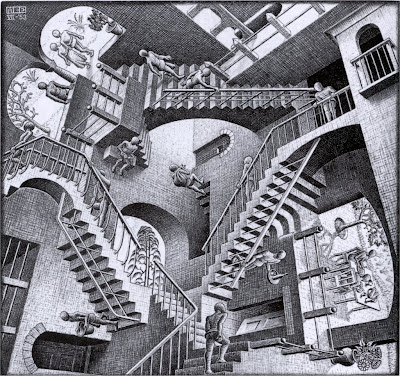RELATIVITY by M.C. Escher, 1953
In connection with his ideas and insights, I also remember a certain post by a British blogger and writer talking about his views and disagreement on the current preference in the publishing world: to stick to one genre if you're a beginner. They say that you're doomed if you don't stick to one since you can only be known in one genre. Only an established and popular writer may break that law if you're not a genius.
There's a grain of truth in that commandment especially for budding writers trying to make it in the commercial publishing today. This is probably the best and shortest path to success given the current demand for genre-specific reads (like YA and graphic novels). The message they give is Don't go any further if you haven't established your name yet. This is agreeable. JK Rowling's new adult book is out but it's perfectly okay, since she's already popular-- a household name. But sometimes, the only way to establish your name is to discover a genre or two that reflects your character as a creator.
I think this "genre confinement" for a newbie is basically an artistic restriction that limits the author himself, not resorting to experiments and not discovering new or less known methods by just sticking to the current strategy bounded by illusion of "commercial success." My take on this as a reader is simple. If you want to become a pro, you can start by being a good writer first. It's okay to experiment and skip genres like skipping stones in a pond. From variable perspective you will discover a lot of bad, but also something good and worthwhile.
In the past, authors like Thomas Hardy, Charles Dickens, and G.K. Chesterton became successful not because of their chosen genre. They were known because of their style of writing that became perfectly distinct from each other's style. They were not thinking of any massive, commercial, return on investment; only basic patronage from people of their communities who love to read. The basic readership by loyal and trusted fans, in short. There is no greater motivation than the possibility doing what you love and they succeeded for knowing it once in their lives.
Looking at the legion of modern writers the past two decades, how did Dan Simmons, Stephen King, and Neil Gaiman became popular and established authors while crossing genres? By becoming effective and believable storyteller, regardless of the genre.
Stephen King is loved by his fans (and loathed by his critics) as an horror author, but he is best when he wrote On Writing -a non fiction work that's becoming a reference for students of the art.
Dan Simmons' first novel Song of Kali won the World Fantasy Award for Best Novel in 1986. It was a magnificent modern horror novel. But when he published the sci fi Hyperion (the first in Quadrilogy) in 1989, nobody cried foul when he crossed over into the sci fi genre especially after winning both the Locus and Hugo Award for Best Novel the following year. These days, Simmons is writing in the genre of historical fiction and thrillers.
Neil Gaiman started writing late, but it was a good "late realization" for him. I don't have to discuss all his merits as a good writer, the success of Coraline and The Graveyard Book as children's literature and Sandman as adult fantasy and horror literature in the comic book form are enough.
This ruckus will never end between "writing as a profession" and "writing as a passion," as much as the classic debate between "commodity" and "art" that lies in the soul of writing. If you want to write for a living, you can learn a lot by skipping between genres and studying the differences. There are many paths to success as much as paths to failure. There are the hidden paths, some short ones, as well as the best one. The point here is, since there are many paths to success you can just follow the suggested ones, or you can make your own unique path towards it. The choice is in your hands.


No comments:
Post a Comment
Please share your comments here!